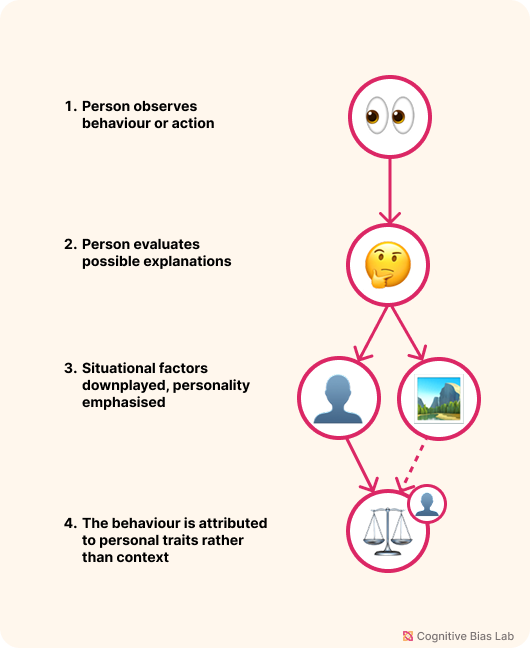Fundamental Attribution Error
Your progress on this bias test won't be saved after you close your browser.
Understanding Fundamental Attribution Error
Fundamental Attribution Error
We're quick to blame others' personality flaws for their actions, yet we rarely consider the situational pressures they face. This bias leads to unfair judgments and missed opportunities for empathy.
What is the Fundamental Attribution Error?
The Fundamental Attribution Error occurs when we overemphasize personal characteristics to explain someone else's behavior, while underestimating the impact of situational factors. This cognitive bias functions as a mental shortcut that can significantly distort how we perceive and judge others.
Why Does It Matter?
Key Impacts:
- Creates a disconnect between perception and reality when evaluating others
- Leads to unfair judgments in professional and personal relationships
- Can damage team dynamics and leadership effectiveness
- Often operates unconsciously, making it particularly challenging to address
Real-World Consequences
In workplace settings, this bias can manifest when managers attribute an employee's missed deadline to laziness or incompetence rather than considering factors like unexpected technical obstacles, shifting priorities, or inadequate resources. This misattribution can lead to improper performance evaluations, strained relationships, and missed opportunities for appropriate support.
Understanding this bias is essential for developing fairer assessment practices and building stronger interpersonal relationships based on a more complete understanding of human behavior.

Visual representation of Fundamental Attribution Error (click to enlarge)
Examples of Fundamental Attribution Error
Here are some real-world examples that demonstrate how this bias affects our thinking:
The Late Colleague
Your colleague arrives late to an important meeting, and you immediately think they're disorganized and unprofessional. Later, you discover they were delayed by a major traffic accident on the highway and had actually left home 30 minutes early to ensure punctuality. This demonstrates how we often jump to personality-based conclusions while overlooking external circumstances that provide a more accurate explanation.
The Customer Service Interaction
After experiencing a rude interaction with a customer service representative, you conclude they're inherently inconsiderate and poorly suited for their role. What you don't see is that they've been working a double shift due to staff shortages, have handled 50+ similar complaints that day, and just received news about a family emergency. By attributing their behavior solely to personal traits, you miss the significant situational pressures influencing their actions.
How to Overcome Fundamental Attribution Error
Here are strategies to help you recognize and overcome this bias:
Pause for Situational Factors
Before judging character, list at least three external reasons that could explain the behavior. This habit helps disrupt snap dispositional assumptions.
Use a Balanced Evaluation Template
Break down observations into 'Behavior,' 'Situational Factors,' and 'Dispositional Factors' to encourage fair, context-aware judgments—especially in formal reviews.
Test Your Understanding
Challenge yourself with these questions to see how well you understand this cognitive bias:
A new team member contributes little during meetings. The team lead concludes they're uninterested and unmotivated. What crucial information might the lead be overlooking?
Academic References
- Ross, L. D., Amabile, T. M., & Steinmetz, J. L. (1977). Social roles, social control, and biases in social-perception processes. Journal of Personality and Social Psychology, 35(7), 485–494.
- Ye,S. (2024). Fundamental Attribution Error in the Classroom: Why and How Bias Hurts?. Lecture Notes in Education Psychology and Public Media,61,27-34
- Fundamental attribution error (social psychology) | EBSCO. (2024). EBSCO Information Services, Inc.